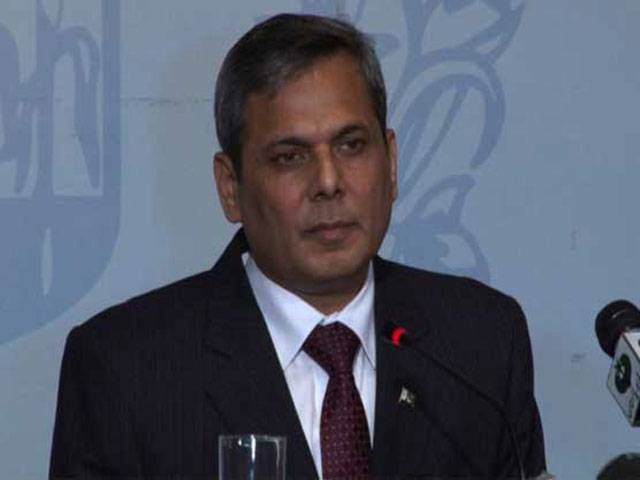ISLAMABAD - Pakistan yesterday said India was bent upon destroying peace in Pakistan and threatening regional stability.
Addressing a weekly media briefing here, foreign office spokesperson Nafees Zakaria said Pakistan had taken up the issue of Indian involvement in terrorism and terror financing in Pakistan with UN Secretary General António Guterres.
“Pakistan is one of the biggest victims of terrorism, more so, of the terrorist activities perpetrated by Indian state agencies. They (India) not only perpetrate such activities but also finance such terror activities. We have already taken up this issue and we will constantly take it up with the international community,” he said.
He added: “Indian defence build-up is not in the interest of the region. It is a matter of grave concern and endangering the peace in the region and disturbing the strategic balance.”
Zakaria said India was also targeting China Pakistan Economic Corridor (CPEC) which was a regional economic development project and will benefit the entire region.
He said Pakistan-China cooperation on CPEC and a number of other projects was well known and reflected the special relationship between the two countries. “Cooperation is better than conflict and we expect other countries to understand this,” he said.
In context of the CPEC, he said, India had opposed it and “we have also responded to it. Couple of months back, we placed before you the charge sheet against number of Indian High Commission officials, how they wanted to sabotage CPEC, among other subversive activities.”
Zakaria said Indian spy Kulbushan Yadav in his confession also revealed that sabotage of CPEC was the plan. “We are looking at this aspect of defense build-up as it is disturbing the strategic balance of conventional weapons and its adverse bearing on regional peace,” he added.
Zakaria urged the international community to hold India accountable for its crimes against humanity in Kashmir. “We remain committed to the Kashmiris’ legitimate movement for self determination,” he said.
He said, “India was also violating ceasefire on the Line of Control and Working Boundary resulting into loss of precious civilian lives.” He condemned the killing of three soldiers at LoC due to Indian unprovoked ceasefire violations. He said: “Pakistan has repeatedly lodged protest with Indian in this regard.” Zakaria said India desperately wanted to divert attention of world community from Kashmir.
He said the foreign office has been regularly briefing the diplomatic community in Islamabad including P5 countries, Organization of Islamic Cooperation ambassadors, and Representatives of other countries on the situation created by India that threatens peace in the region.
“However, the role of UNMOGIP is crucial. We call upon the UNMOGIP, which has the mandate to monitor the ceasefire violations at LoC and Working Boundary, in accordance with the UN Security Council resolutions, to play its role. Pakistan has always extended full cooperation to UNMOGIP. On the contrary, India constantly violates the UN Resolutions by not cooperating with UNMOGIP,” he said.
To a question, the spokesperson said continuing instability in Afghanistan had created space for the non-state actors and terrorist organizations to find their foothold in that country.
He said: “Jamatul Ahrar which is based in Afghanistan claims carrying out terrorist’s incidents in Pakistan.”
He added: “We have raised the issue terrorist activities on Pakistan soil from across the border. We have also urged the Afghan leadership to take necessary steps to address our concern.”
He said the six-party talks, which concluded this week in Russia, discussed regional approaches to the security situation in Afghanistan and agreed on enlargement of this six-party format with the inclusion of Central Asian countries, at first. The six-party conference on Afghanistan was held in Moscow and attended by Afghanistan, Pakistan, China, India and Iran.
Zakaria said border management was very important in addressing the issue of cross-border terrorism, which is a mutual concern of both countries. “Because there is infiltration from Afghan side and terrorists cross the border and carry out terrorist activities in Pakistan. It is actually for this reason that we have put in place the border control and management mechanism,” he said.
The spokesperson said Pakistan and Afghanistan have to cooperate with each other to address this issue and the concerns of both sides.
Regarding UN Secretary General António Guterres’ meeting with Saudi King Salman Bin Abdul Aziz where he said Islamophobic feelings, policies and hate speeches were fuelling terrorism across the globe, Zakaria said: “We could not agree more with the statement of the UN Secretary General. In fact, Pakistan has been at the forefront of global advocacy against Islamophobia and defamation of religions at international forums, including the UN and the OIC.”
About Pakistan’s refusal to attend South Asian Speakers’ Summit in Indore on February 18-20, the spokesperson said: “Indian government was informed that due to the important Session of the National Assembly during that period, the Speaker National Assembly would not be able to attend the event.”
He strongly condemned the recent terrorist attacks in the country and said, “Those behind these terrorist attacks should know that our resilient nation remains undeterred by such cowardly acts rather it further emboldens our resolve to deal with our enemies and the enemies of humanity decisively and eliminate the menace.”
To a question about the data of how many Pakistanis were arrested in Saudi Arabia, he said the reported figure of 39,000 was exaggerated. “Second, you need to look at the reasons behind their arrests. Most of the people are those who have violated local Saudi laws.”






